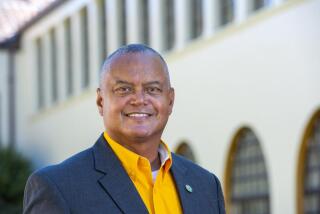New Compton College President Sets Out to Improve Staff Attitudes, Student Skills
- Share via
COMPTON — Edison O. Jackson will begin by planting flowers around campus.
But after that, the newly appointed president of Compton Community College plans to sow deeper seeds of change in the minds of faculty and staff members at the struggling two-year school--change that some may find difficult to accept.
If the college is ever to recapture its reputation as a “top-notch” educational institution, Jackson declared, its officials must alter their attitudes toward the students they are paid to serve.
“Our students have to be treated as though they’re millionaires,” Jackson said. The fact that many come from impoverished backgrounds and need remedial help shouldn’t lead teachers to work any less hard to provide them with a quality education, he said.
“There has been some overall decline in the work of many employees for various reasons,” Jackson explained. “What we’re trying to say is that it’s a new day, with new expectations.
Reorganization Plan
“People need to understand that this community wants the best for its children. This is not a second-class institution, so we’re not going to put up with second-class standards.”
To that end, Jackson submitted a broad reorganization plan Tuesday night intended to instill stricter standards of academic excellence in students and a greater professionalism in the college staff. The plan, approved by the college board of trustees and applauded by faculty leaders, echoed the tough tone Jackson sounded when he arrived in July and told his administrative staff that he would not immediately renew their contracts.
(A college spokesman said Jackson apparently has no firm plan to discharge anyone. Even if he wanted to fire a faculty member, most are protected through this academic year by a collective bargaining agreement.)
“While things are not bad there, they certainly need to be improved,” trustee Charlie Mae Knight said. “We wanted an education visionary (as president) who would look at our situation here in a minority belt. We have to provide a different kind of instruction.”
For nearly two decades, the college has been dogged by declining enrollments, reduced funding and slumping morale, in part because of social changes that have gradually altered the community it serves. A once-predominantly white student body has shifted “to one in which blacks are the overwhelming majority . . . and whites can almost be counted on one’s fingers,” Jackson wrote in an inch-thick report.
As the college began receiving more students who were ill-equipped and in need of remedial instruction, Jackson explained, teachers became “frustrated” over either their inability to help or their sense that the school’s rich academic tradition was being compromised. From time to time, allegations of racial prejudice within the roughly half-black, half-white faculty were taken to the college board.
“I think with all of the tension that has built up in the last few years there may have been a few problems,” acknowledged Prof. Robert Morgan, president of the Academic Senate. “It doesn’t take much for some individual to say certain things or do certain things and then think twice. There could be some people who are very irritable to the students, but I think you’d find that at any college.”
Good Students Fled
Many good students fled to surrounding schools, some going so far as to lie about their legal residency in the Compton district. Knight said the college was wrongly branded as a beleaguered institution unable to provide the quality of instruction that universities wanted from students wishing to transfer in pursuit of more advanced degrees.
“For a multiplicity of reasons . . . Compton Community College has seen its public support decline alarmingly in recent years,” Jackson wrote in his reorganization plan. To change that, the college needs “a fundamental and dramatic shift” in focus so it can better serve students without devaluing the academic degrees they seek.
Trustee President Carl E. Robinson said Jackson has free rein to make changes and, at least for now, enjoys the unanimous backing of the five-member college board.
And even though Jackson is taking hard aim at teachers, faculty leaders such as Morgan praised his back-to-basics program. “We feel his approach is something that has been needed for years,” Morgan said. “We are anxiously awaiting the start of the fall semester.” In 15 years as a Compton teacher, Morgan added, “I haven’t said that too many times.”
Spruce-Up Ordered
Some of Jackson’s changes will be immediately visible--groundskeepers have been directed to plant flowers, mow lawns and generally spruce up the 38-acre campus in time to greet students when fall classes begin Sept. 4. Now that the college has begun to emerge from years of serious financial trouble, Jackson believes that it can afford to make those and other “aesthetic” improvements that can transform a stark campus into a more inviting place.
Beyond that, the changes will be less apparent and less immediate. However, “within two years,” Jackson said, he hopes formalize virtually every college procedure so that neither students nor staff members will have any doubt about what is expected of them.
Among other points described in Jackson’s plan:
Several administrators will be asked to revise or realign their duties to streamline operations and better suit the school’s reduced size. Enrollment that once exceeded 6,500 now has leveled off at about 4,500 students.
- The college’s current remedial offerings will be combined under a separate division of “basic skills” that will signal a stronger commitment on the college’s part.
- A new course in ethnic studies will be established to “help students understand their own heritage and cultural roots as well as the heritage they share in common.”
A renewed effort will be made to reach the community by offering seminars, specialized instruction and specific job training similar to the college’s recently formed curriculum in the construction trades.
- The overall curriculum will be reviewed and revised so that students are placed on a more structured academic path. Jackson declined to cite specific examples, but said he believes that some instructors are offering courses that are too advanced or too far afield from what two-year students require.
- Classes will be offered at times convenient to students, and more classes will be offered during the afternoon, although most Compton instructors have become used to ending their teaching days around lunchtime.
- For the first time, faculty members will be required to submit to annual evaluations and take part in advising and counseling students, the latter requirement being typical of the type of “supportive, humanistic” environment that Jackson believes Compton needs. “I want faculty to have a greater involvement with the students beyond the classroom,” he said.
Of all his proposals, Jackson acknowledged that the most important--his desire for “a change in attitude” on the part of all college employees--may be the most elusive. But he said that he is confident that all but a few will be willing to make the adjustments he desires, which include such relatively simple things as showing up for work on time.
Jackson said he will exercise patience--”This is nothing that can occur overnight.” But he pledged never to allow faculty members to cite the inherent difficulty of teaching disadvantaged students as “a crutch” to rationalize their own performance.
“I am challenging their professionalism,” Jackson said. Starting now, “there’s a higher standard that we’re embracing” at Compton College. “We want to provide the best education that is humanly possible.”
More to Read
Sign up for Essential California
The most important California stories and recommendations in your inbox every morning.
You may occasionally receive promotional content from the Los Angeles Times.











